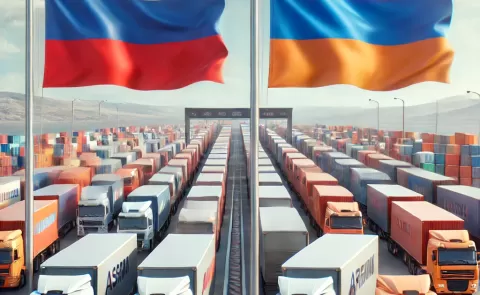
Russia launches its counter-campaign in face of the Georgian solidarity movement

As a reaction to the mobilization of the Georgian citizens in the wake of the imposed flight ban by the Russian President Vladimir Putin, the Russian public and private actors have started their own campaign in countering the solidarity movement for Georgia.
Many of the officials in the Kremlin blame the “russophobic state” of the Georgian political elites for the current situation between the two countries. Speaking at a meeting with the heads of Russian regional non-profit organizations, the Russian Minister of Foreign Affairs, Sergey Lavrov, said that “Western sponsors are ready to turn a blind eye to the violent riots by nationalists and their Russophobia, just to sever all ties of the Georgian people with our country and to rewrite our common history.”
The Russian President’s press secretary Dmitry Peskov shares the same point of view when asked by reporters about a possibility to lift the flight bans to Georgia. “The resumption of airline flights from Russia to Georgia is possible after the situation in the country returns to a non-Russophobic state,” he said.
As a reaction to the online campaign that promotes tourism in Georgia, the Press Secretary of Russia’s tourism industry union, Irina Tyurina, said that her union considers promoting Armenia instead. “People visit Georgia for the environment, delicious food and wine. All this exists in Armenia as well, so many tourists change their destinations from Georgia to Armenia,” said Tyurina. The Russian Red Wings Air Company began offering ticket exchanges for Georgian tickets with tickets to Yerevan or Makhachkala instead. On 21 June the company announced that it closes its sales of tickets to Georgia starting from 8 July and that all passengers who booked their flights to Georgia would have their full ticket price refunded.
According to Mikhail Troitskiy, a foreign-policy analyst based in Moscow, the Kremlin’s motivation may not be about Georgia itself as much as about proving that it can throw its weight around. “Russia is keen to show it has economic cloud that enables it to operate by economic statecraft just like the United States and its allies. It mirrors the thinking about the sanctions [from USA and EU] against Russia – you want to create costs for Georgian businesses and for them to lobby their government against whatever anti-Russian moves that they may be contemplating,” he said.
Troitskiy warns though that the imposed sanctions by Russia might have an opposite effect to what the Kremlin elites expect. “The Russian government has long argued that the Western sanctions have in fact had the opposite effect, consolidating the Russian people against the West and toward more reliance on other partners – ironically, the same effect is now being seen in Georgia. It mirrors Russia’s own rhetoric, that sanctions have a rally-around-the-flag effect,” he added.
See Also


Armenia and Russia Reaffirm Strategic Ties Amid Speculation of Strained Relations

Sergey Naryshkin Accuses Britain of Destabilizing Georgia

Armenia Records 5.9% GDP Growth in 2024, Missing 7% Goal

Yerevan Balances Strategic Ties with Both US and Russia, Says Foreign Minister

